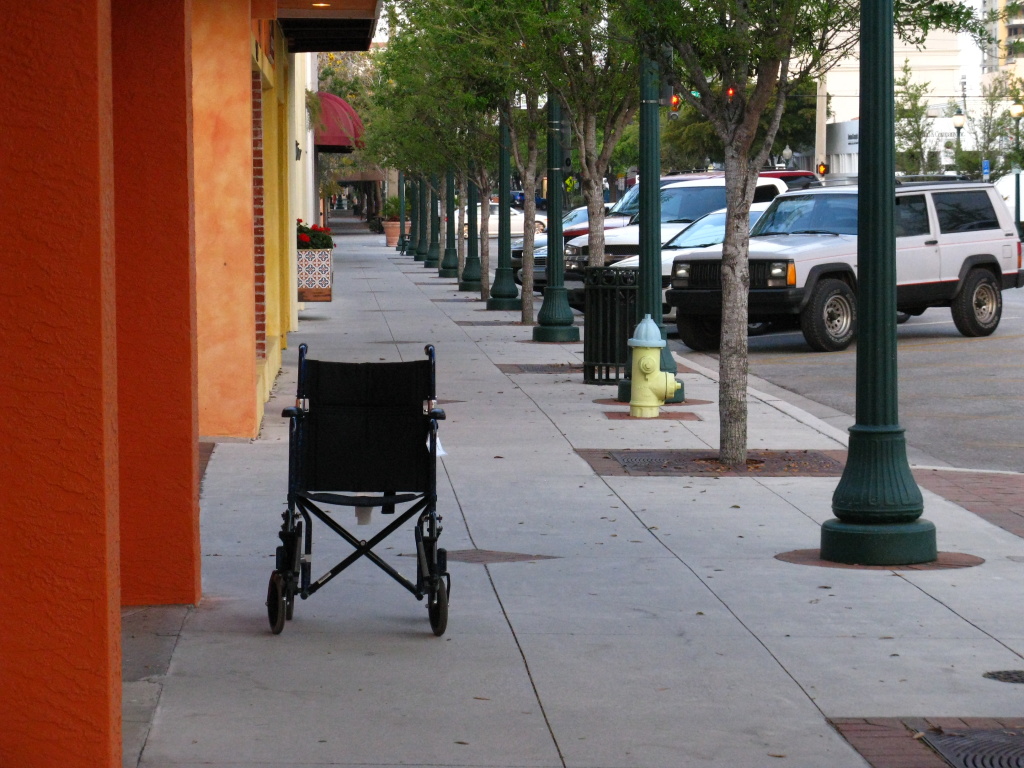mark handler
SAWHORSE
Sidewalk access lawsuit against Long Beach now a class action

http://www.scpr.org/news/2015/09/18/54504/sidewalk-access-lawsuit-against-long-beach-now-a-c/
A lawsuit alleging Long Beach has failed to make its sidewalks safe for people who use wheelchairs has been certified as a class action, raising the stakes in the case.
Federal judge Dale S. Fischer issued the order Thursday. The original suit had five plaintiffs, but the class could include thousands more Long Beach residents and visitors with mobility disabilities.
The complaint, Ochoa v. City of Long Beach, is named for plaintiff Hector Ochoa, who lives in Signal Hill, a block away from Long Beach, and frequently travels to Long Beach using a motorized wheelchair. The suit alleges that, due to the city's cracked and damaged sidewalks and other pedestrian barriers, Ochoa is deprived of his independence and segregated from his neighborhood and parts of his community.
The city has failed to fix access barriers on its pedestrian routes, the suit alleges, pointing to a lack of curb cuts at intersections, uplifted and cracked sections of sidewalk, steep and hazardous slopes and sidewalks blocked by poles and other objects.
The plaintiffs hope the judge's certification of the suit as a class action will encourage city officials to settle rather than fight the litigation, says Kara Janssen, a staff attorney with Disability Rights Legal Center, which is representing the class along with Disability Rights Advocates and the law firm of Goldstein, Borgen, Dardarian & Ho.
Michele Levinson, Long Beach's deputy city attorney, said in an email that "we anticipated the class would be certified," adding that the city "is fully committed to addressing the issues raised by the plaintiffs, and in fact has already 'come to the settlement table.'"
"Contrary to the suggestion raised by the Plaintiffs," Levinson wrote, "the City’s counsel, the City Council and the Attorneys for the Plaintiff have been actively negotiating a settlement for months," asserting that the two sides "have made substantial progress towards a comprehensive resolution of the entire case."
Another settlement discussion is planned for October, Levinson said.
"Most importantly," she added, Long Beach's newly adopted 2016 budget includes "a new, full time ADA [Americans with Disabilities Act] Coordinator, as well as funds to obtain a new transition plan." The ADA requires cities to come up with a plan to ensure that existing and future structures and infrastructure comply with the federal law.
In April, the city of Los Angeles settled a similar lawsuit for $1.4 billion, the largest disability access class action settlement in U.S. history, according to plaintiffs' lead counsel in that case. That settlement must still be approved by a federal judge.
In that suit, Willits v. City of Los Angeles, the city agreed to make the city's sidewalk system more accessible to people with disabilities by fixing broken sidewalks, installing accessible sidewalks where they don't yet exist and removing other barriers.

http://www.scpr.org/news/2015/09/18/54504/sidewalk-access-lawsuit-against-long-beach-now-a-c/
A lawsuit alleging Long Beach has failed to make its sidewalks safe for people who use wheelchairs has been certified as a class action, raising the stakes in the case.
Federal judge Dale S. Fischer issued the order Thursday. The original suit had five plaintiffs, but the class could include thousands more Long Beach residents and visitors with mobility disabilities.
The complaint, Ochoa v. City of Long Beach, is named for plaintiff Hector Ochoa, who lives in Signal Hill, a block away from Long Beach, and frequently travels to Long Beach using a motorized wheelchair. The suit alleges that, due to the city's cracked and damaged sidewalks and other pedestrian barriers, Ochoa is deprived of his independence and segregated from his neighborhood and parts of his community.
The city has failed to fix access barriers on its pedestrian routes, the suit alleges, pointing to a lack of curb cuts at intersections, uplifted and cracked sections of sidewalk, steep and hazardous slopes and sidewalks blocked by poles and other objects.
The plaintiffs hope the judge's certification of the suit as a class action will encourage city officials to settle rather than fight the litigation, says Kara Janssen, a staff attorney with Disability Rights Legal Center, which is representing the class along with Disability Rights Advocates and the law firm of Goldstein, Borgen, Dardarian & Ho.
Michele Levinson, Long Beach's deputy city attorney, said in an email that "we anticipated the class would be certified," adding that the city "is fully committed to addressing the issues raised by the plaintiffs, and in fact has already 'come to the settlement table.'"
"Contrary to the suggestion raised by the Plaintiffs," Levinson wrote, "the City’s counsel, the City Council and the Attorneys for the Plaintiff have been actively negotiating a settlement for months," asserting that the two sides "have made substantial progress towards a comprehensive resolution of the entire case."
Another settlement discussion is planned for October, Levinson said.
"Most importantly," she added, Long Beach's newly adopted 2016 budget includes "a new, full time ADA [Americans with Disabilities Act] Coordinator, as well as funds to obtain a new transition plan." The ADA requires cities to come up with a plan to ensure that existing and future structures and infrastructure comply with the federal law.
In April, the city of Los Angeles settled a similar lawsuit for $1.4 billion, the largest disability access class action settlement in U.S. history, according to plaintiffs' lead counsel in that case. That settlement must still be approved by a federal judge.
In that suit, Willits v. City of Los Angeles, the city agreed to make the city's sidewalk system more accessible to people with disabilities by fixing broken sidewalks, installing accessible sidewalks where they don't yet exist and removing other barriers.
